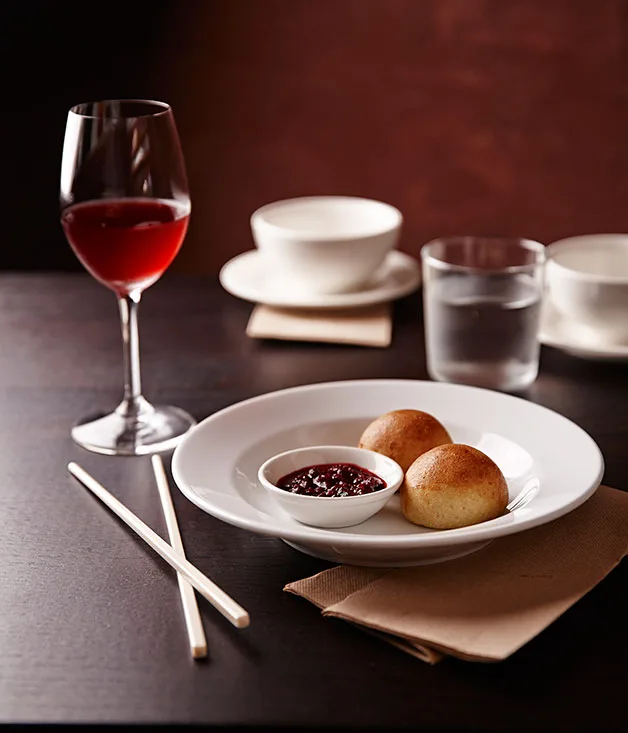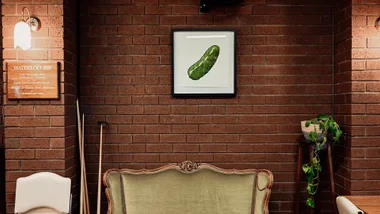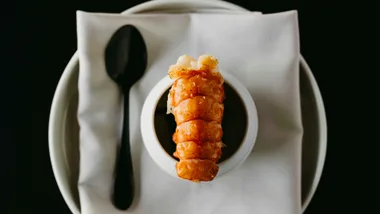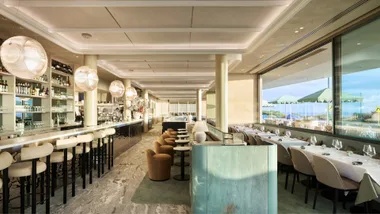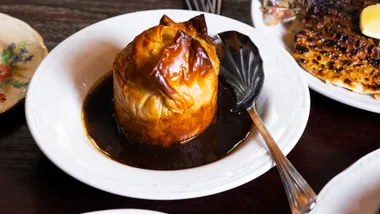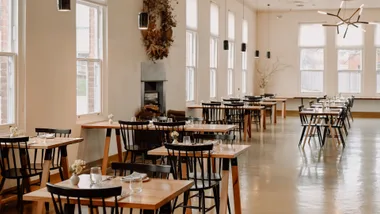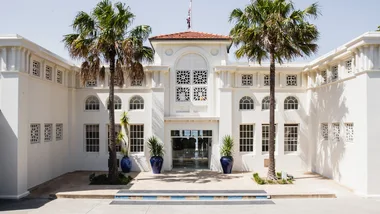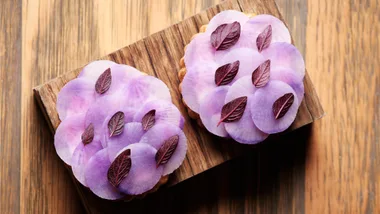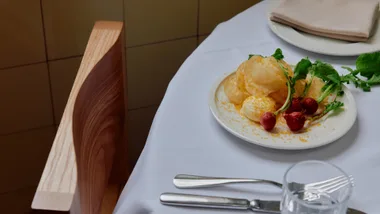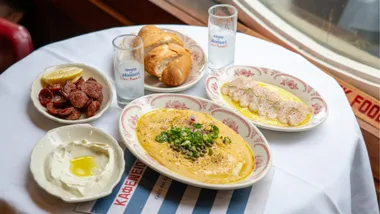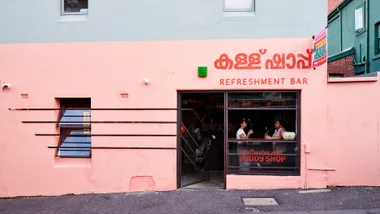Shop 1, 28 Macleay St, Potts Point, NSW, (02) 9332 3300.
Licensed.
Cards AE MC V EFT.
Open Mon-Sun 5.30pm-late.
Prices Entrées $7-$28, main courses $21-$48, desserts $10.
Vegetarian Six entrées, five main courses.
Noise Not quiet, but quieter than the old place.
Wheelchair access Yes.
Minus Could be prettier.
Plus Still pretty amazing.
Olives. It’s not every Chinese restaurant that offers them at the start of the meal. But then Billy Kwong has never been every Chinese restaurant. The guys from Vini and 121BC are now partners in the restaurant, says our waiter as he sets them at the table, “so we’re a little bit more Italian now”. Celebration, collaboration, community are now the restaurant’s buzzwords, but at heart this is a very personal restaurant, and it remains an expression of owner-chef Kylie Kwong’s interests and idiosyncrasies. If Kylie wants olives, then olives there will be. And that’s what makes it great.
Even before Kwong’s face started appearing on television, book jackets, postage stamps and advertisements for insoles, the force of her personality was palpable. She appears to be a woman of bold conviction and fierce loyalty, and these qualities, barely contained by the tiny room, were a big part of what made her Crown Street restaurant a success from the day it opened back in 2000. The restaurant she has just opened on Macleay Street on the former Arun Thai site is more than twice as big, and she has brought on new partners, restaurateur Andrew Cibej and backer David King of the Vini/Berta/Ester/121BC axis of excellence, to make the transition from Surry Hills. But the force of her personality hasn’t been diluted by the bigger room or the enlarged cast of players. Instead Kwong seems more present and looms larger in the new restaurant than she has at Billy Kwong for many a year. You may no longer be able to hear her clap her hands to send every order to the tables from wherever you’re sitting, but you can see her working the pass, an LED-lit headset clamped to her head, her eyes refulgent with concentration behind her frames, as though she’s weighing up whether to call in a drone strike on a high-value asset in northern Pakistan rather than fire out an order of steamed silken tofu with kombu and shiro shoyu.
Kwong has long been willing to put her money where her mouth is. She was an early and vocal advocate of organics and biodynamic produce. (Some diners might’ve thought the $40-plus asked for some main courses in the relative discomfort of Crown Street was more a matter of putting their money where her mouth was.) She made the restaurant carbon-neutral in 2007, and committed to buying Fair Trade products around the same time. The Chinese pantry-staples in her kitchen – oyster and hoisin sauces among them – are free of industrial additives, her sesame oil is biodynamic and the sparkling water is carbonated on-site. She hasn’t quite got as far as Ben Shewry’s plans to hand his guests their kitchen waste to take with them when they leave Attica, but it can’t be far off. If she can find a new way to make her restaurant more of a force for good without compromising its essential mission to sell tasty Canto-stralian food to the people, she’ll follow it up.
This approach is not without its challenges. The ecological motives behind putting insects on the plate are sound, but I’m still among those not entirely sold on the taste and texture of the examples served at Billy Kwong in the last year or so. The limited inroads they’ve made into the menu suggest that my response isn’t unusual. They’re by no means vile; they’ve just got a long way to go before they compete with a really juicy piece of white-cut poached chicken or a steamed Sydney rock oyster with ginger and spring onions.
But the collaboration Kwong began with South Australian farmers Gail and Mike Quarmby of Outback Pride in 2012 is a different story. Bringing their fresh native Australian produce onto the menu felt right philosophically, but more importantly it clicked with the cuisine and brought new energy to the kitchen.
The very bitterness and astringency and sometimes coarse textures that make so many indigenous plants a challenge for chefs to work with provided a welcome counterpoint to the smooth, soft and sweet aspects of Cantonese cooking that are so prominent in the food at Billy Kwong. A fillet of snapper, steamed sweet under that classic ginger-spring onion, for instance, could find an elegant complement in a bowl of bower spinach, ice plant other salty succulents, all slippery, crunchy and glossy from the wok.
The single best new addition to the menu of the last five years, too, might be the savoury saltbush cakes. Deep-fried crisp and brought to the table hot with a chilli sauce, there’s a grey-green flavour to the minced saltbush filling that cuts the sweetness of the short pastry perfectly. Their shape recalls the onion-filled cakes you’d see in China, but the taste speaks as much of the wildness of the Australian interior as it does Shenzhen’s back streets or the hutongs of Beijing.
Wallaby, that eco-friendly meat of the moment, makes a couple of interesting appearances on the menu. The oxtail-like red braise of tail with black bean and chilli has lately become a fixture, and the baked buns, crisp of shell, tasting vaguely of scones, filled with finely minced wallaby meat and served with a Davidson’s plum relish really ought to be picked up by yum cha carts nationwide. Davidson’s plum, a native rainforest fruit, also provides the sweet-tart fillip in the current iteration of the signature duck with orange. It’s been billed as crisp-skinned, but the bits of chopped bird cooked on the bone are much more like a spice-crusted arrangement than anything lacquered or Peking duck-like. The meat, rough-textured and well-rendered, is the perfect antidote to the despair experienced by diners exasperated by all the pink bubblegum passing for duck in Australian restaurants where the breast is cooked sous-vide and then seared. Its status as a modern Sydney classic is assured.
Kwong’s cuisine has always been her own – identifiably Cantonese, but with an identifiable set of stresses and accents. Her training was by no means strictly Chinese: Neil Perry was a key mentor, Bill Granger an early collaborator (the Billy in the name has proven a lasting contribution, though he stepped away from the business very early in the piece, back in 2000). Herbs, shoots and leaves erupt from her plates with more vigour than you’d expect to see in Kowloon or downtown Guangzhou. Hokkien noodles, steamed to a deliciously giving texture, are dressed with a good hit of Sichuan chilli oil and a tonne of shredded carrot, cucumber and fresh chilli, and beansprouts, sprigs of dill, mint and coriander. The nest of micro-herbs topping firm, lightly browned rice noodle rolls packed with braised brisket, meanwhile, seems almost Vietnamese. It works.
At Macleay Street, Kwong has also upped the ante on the local-seasonal-community front. “Wild” weeds such as fat hen, amaranth and purslane picked from St Canice Parish and Woolloomooloo Community Garden are transformed into a ginger-rich stir-fry. Real Ale from Newtown brewtards Young Henrys, meanwhile, provides an interesting through-line for fish wings (the swim fins of, in this case, snapper, blue-eye and kingfish) that are deep-fried then braised with tomato and sweet lardons of “sticky” belly pork.
Young Henrys also appears prominently on what must be the most out-there drinks list in the country. Put together largely by 121BC’s Giorgio De Maria (a past GT Sommelier of the Year), it’s uncompromisingly interesting. The Billy Kwong “Project” booze is flagged up front – bottlings that have been done with the restaurant’s participation, be it bespoke gin or the house quandong saison beer. The wine side of things will really come into its own with the current harvest, but that’s not to say things aren’t already wild and woolly. The by-the-glass offer alone is well off the beaten track, even by the standards of Sydney circa 2015. There’s Tom Shobbrook’s Bianco, a cider-like sauvignon blanc, and on the same page the Bianco di Nero from Victorian winemakers Sutton Grange, which is essentially a white wine but made with cab sav grapes. If you’re looking for a recognisable show pony or a classic, familiar workhorse of a wine, you’ll instead find a list stocked with unicorns and dragons, with the occasional colt from old Regret thrown in for good measure. It’s a wild ride, but with the expert assistance and potent enthusiasm of beverage manager Nicola Calvert, it’s exhilarating. Her recommendation of a highly unusual, zesty chardonnay from Le Temps des Cerises, a cult producer in the Languedoc, to go with the duck is as flattering a pairing as the dish has seen in its 15 years.
Dessert is a gesture rather than a highlight. The ginger panna cotta with quandong syrup is admirably fuss-free and executed with confidence, but fairly forgettable. Go with the entirely unadorned and in no way Chinese scoop of Fair Trade chocolate mousse, or opt for another round with the wine list instead.
The room is not, to my mind, a highlight of George Livissianis’s recent work, and it pales against the coherence of his designs for near-neighbours The Apollo and Cho Cho San. It isn’t, to use that most Kwongian of adjectives, especially beautiful. On the plus-side, noise and light levels are apt, and it’s heartening to see the old sign and that vast and wonderful lantern light-fitting from the original restaurant have been kept. The waiters remain endearing and unaffected for the most part, the slightly harried quality of the service contrasted by the seemingly unflappable calm of manager Kin Chen standing sentry at his lectern, urbane beneath his outsize spectacles and comma of a forelock.
The important thing is that it’s more comfortable. Kwong has added a couple of new dishes and tweaked the repertoire, but her food seems more appealing simply because it’s easier to appreciate from the comfort of a chair with four legs and a back at a table made to grown-up dimensions and spaced with more care.
It’s not a coincidence that so much of the most interesting food in Sydney today is cooked by Billy Kwong alumni, whether it’s Mat Lindsay at Ester, Nic Wong at Cho Cho San, Hamish Ingham at Bar H, or O Tama Carey, latterly at Berta until recently. Right now the mothership is looking better than ever, and commander Kwong is in her element.
